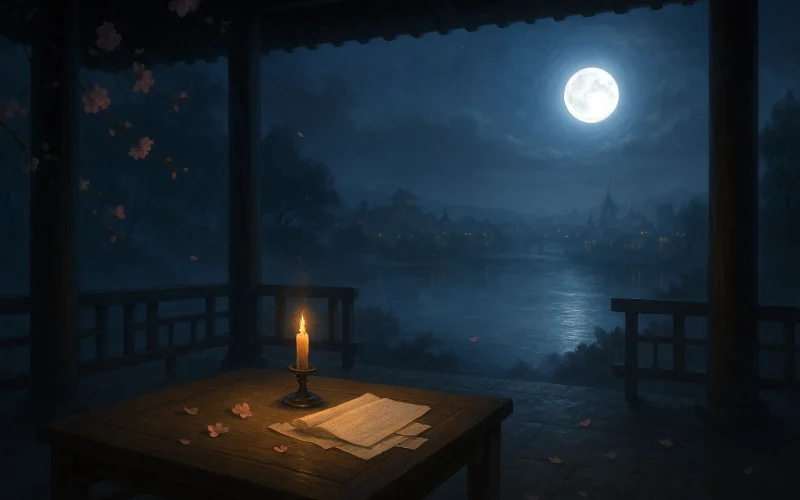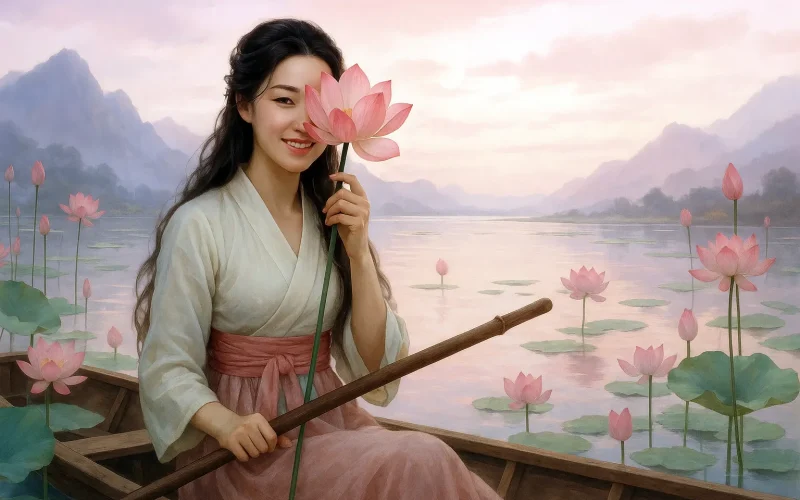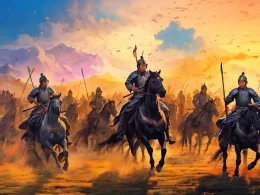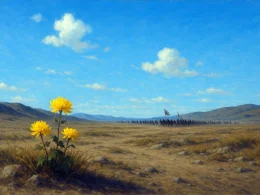When will come back the cavalrymen?
The fair in golden chamber blame the mume then.
In cold snow the mume blossoms fall;
In warm wind should grow the leaf small.
You’re gone with the flute of the new spring;
Its fragrance old greets the cup you’d bring.
What is the use of our flourish hour?
I’ll send you a message from my lonely bower.
Original Poem
「梅花落」
沈佺期
铁骑几时回,金闺怨早梅。
雪寒花已落,风暖叶应开。
夕逐新春管,香迎小岁杯。
盛时何足贵,书里报轮台。
Interpretation
This poem was likely composed during or after Shen Quanqi's period of exile, while he had yet to be reinstated to office. In the late years of Wu Zetian's reign, border conflicts were frequent, and turmoil pervaded the court and the nation. Though Shen Quanqi was renowned in the early Tang for his regulated verse, his official career was fraught with difficulties. The line "When will the armored cavalry return?" is not only a lament from a woman longing for her absent husband but also reflects the poet's own solitude and yearning for his homeland during his prolonged exile. The title "Plum Blossoms Fall" appears to describe nature but actually serves as an emotional catalyst. In classical poetry, plum blossoms symbolize purity and separation—blooming early and alone, fading easily, often evoking sorrow. Through "Plum Blossoms Fall," Shen Quanqi expresses both personal grief and reflections on rise and decline, blending concerns for the nation with sighs over his own fate. This poem exemplifies the transition from the ornate palace style of the early Tang to the profound emotional depth of the mid-Tang.
First Couplet: "铁骑几时回,金闺怨早梅。"
Tiě qí jǐshí huí, jīn guī yuàn zǎo méi.
When will the armored cavalry return?
In the gilded chamber, she grieves o'er early plum blossoms.
The poem opens with a rhetorical question, creating a halting rhythm. "Armored cavalry" points to frontier warfare, while "gilded chamber" shifts to boudoir lament. The juxtaposition of these images—one strong, one delicate—establishes the poem's emotional tension. "Early plum blossoms," blooming alone in the cold, traditionally symbolize resilience but here represent the loneliness and uncertainty of waiting.
Second Couplet: "雪寒花已落,风暖叶应开。"
Xuě hán huā yǐ luò, fēng nuǎn yè yīng kāi.
In the cold snow, the blossoms have already fallen;
With the warm wind, leaves ought to sprout.
This couplet uses seasonal change as a metaphor, imbued with philosophical reflection. While ostensibly depicting natural cycles, it subtly hints at the fluctuations of life and circumstances. The contrast between "fallen" and "sprout" mirrors the passage of time and the unpredictability of fate, alluding to the poet's own transition from prosperity to decline. The word "ought" is particularly nuanced, suggesting a hope that is uncertain—spring may come, but its promise is not guaranteed.
Third Couplet: "夕逐新春管,香迎小岁杯。"
Xī zhú xīn chūn guǎn, xiāng yíng xiǎo suì bēi.
Evening chases the tunes of the new spring;
Fragrance greets the cups of the minor year festival.
This couplet shifts from stillness to movement, from cold to warmth. Spring music, the new year, and the scent of wine—all symbols of joy—highlight the solitude against the backdrop of the preceding lines. The poet uses a lively setting to contrast inner loneliness, creating a poignant beauty akin to "solitude amid shared celebration." The phrases "evening chases" and "fragrance greets" flow dynamically, showcasing Shen Quanqi's masterful rhythmic control in regulated verse.
Fourth Couplet: "盛时何足贵,书里报轮台。"
Shèng shí hé zú guì, shū lǐ bào Lúntái.
What value is there in the days of glory?
In the records, news is sent from Luntai.
The conclusion suddenly elevates the poem, turning from personal longing to philosophical reflection on life and achievement. "Days of glory" refers to wealth and honor, while "news from Luntai" alludes to the tale of General Li Guang, who achieved much but received little recognition, his loyalty only recorded in history. This line is both the lament of a woman speaking for her husband and a metaphor for the poet himself—once celebrated for his verse, now exiled, leaving only a legacy in words. The ending is subtle yet desolate, abruptly expanding the poem's scope.
Holistic Appreciation
Though titled as a poem about plum blossoms, it does not merely describe them but uses "blossoms fall" to interconnect emotion, scene, and reason:
- Emotion lies in "gilded chamber grieves"—the pain of personal and national separation;
- Scene appears in "blossoms fall in cold snow, leaves sprout in warm wind"—the flow of time and life;
- Reason emerges in "what value is glory?"—the philosophy of impermanence and the limits of fame.
Shen Quanqi skillfully employs contrast and progression to create emotional undulation: from longing to disappointment, from falling blossoms to sprouting leaves, from seasonal change to life's realizations, each layer deepens. The language is refined, the rhythm steady, bearing the lingering elegance of palace style while embracing the subtlety and intellectual depth sought by mid-Tang poets. The final couplet, reflecting on reality through the lens of "historical legacy," reveals the scholar's sober self-awareness and resignation, forming the soul of the entire work.
Artistic Merits
- Emotion Through Flora, Scene-Emotion Fusion: Uses the early fading of plum blossoms to convey the grievances of separation, personal fate, and philosophy.
- Layered Progression, Natural Structure: The four couplets respectively express "longing for return—reflection on time—borrowing scenery—realization of reason," with a rigorous structure.
- Movement in Stillness, Restrained Sound and Emotion: Despite scenes of music and feasting, the poem actually contrasts inner solitude.
- Reason and Emotion Combined, Embedded Reflection: Shifts from sorrow to philosophy, from personal grief to insight into life.
- Concise Allusions, Condensed Imagery: Without excessive ornamentation, deep meaning is conveyed in few words, reflecting the calm and clarity of Shen Quanqi's late style.
Insights
This work superficially depicts fading blossoms and human sorrow but actually conveys reflections on rise and fall and insights into the world. The line "what value is glory?" is not only a transcendent view of achievement but also a calm contemplation of life's essence. After experiencing the ups and downs of officialdom, Shen Quanqi uses plain language to express the realization that "prosperity and decay are fleeting, rise and fall have no constant rule." This poem teaches us: beautiful things will eventually wither, power and fame are like falling plum blossoms; only clarity and self-reflection are the enduring fragrance of the soul that does not fade amid wind and snow.
About the Poet
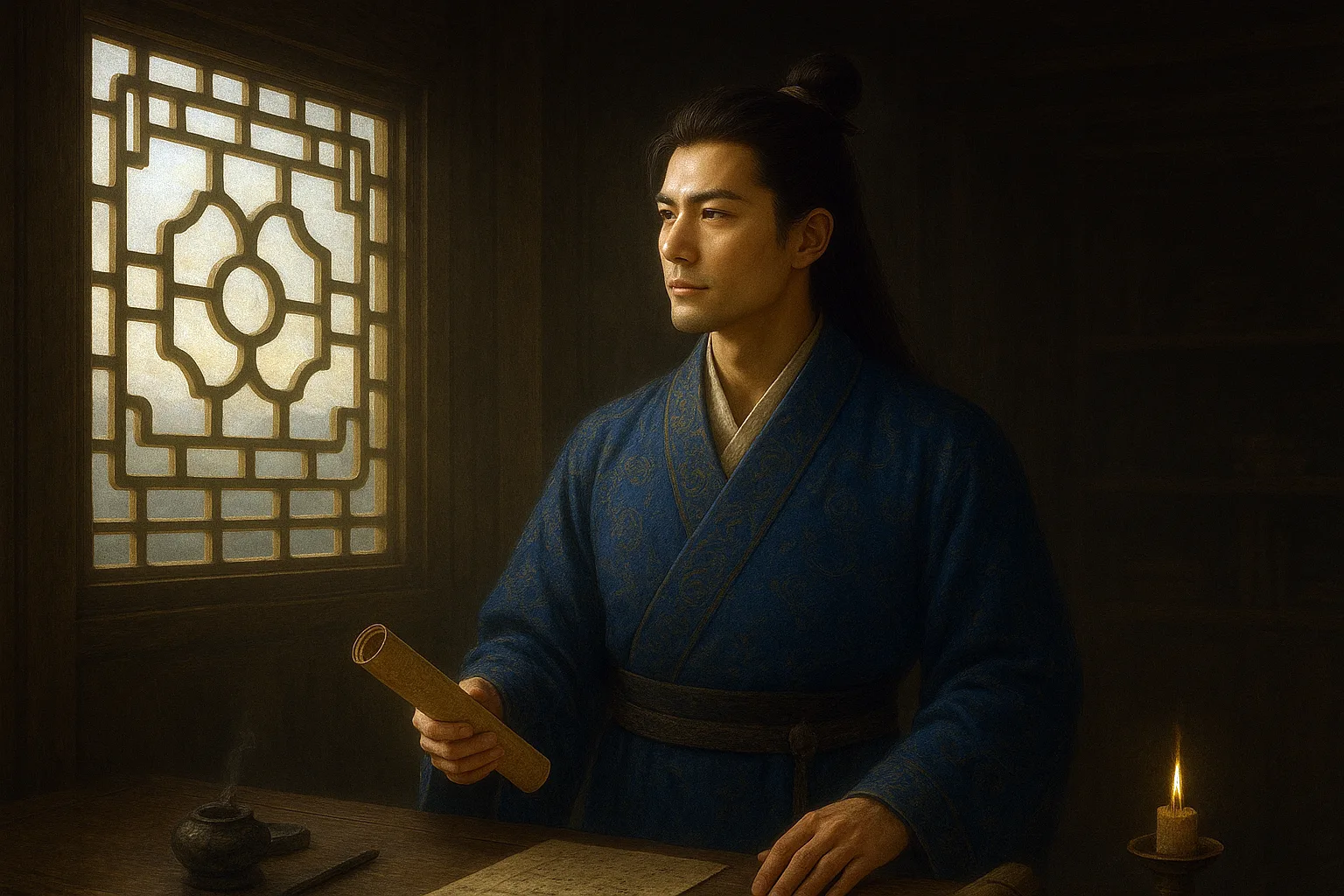
Shen Quanqi (沈佺期 c. 656–715), courtesy name Yunqing, was a native of Neihuang in Henan Province and an important poet of the early Tang Dynasty. Along with Song Zhiwen, he was renowned as one of the "Shen-Song" duo, whose work played a decisive role in finalizing the form of the five-character regulated verse (wuyan lüshi) in Tang poetry. His poems often include courtly compositions and travel-themed reflections, characterized by refined elegance and structural rigor. Shen was particularly skilled in the seven-character regulated verse (qilü), and his writing marks a transition from the lingering style of the Six Dynasties to the flourishing era of High Tang poetry. His contributions hold milestone significance in the development of modern-style verse (jintishi).







